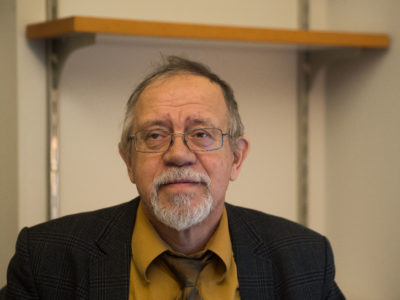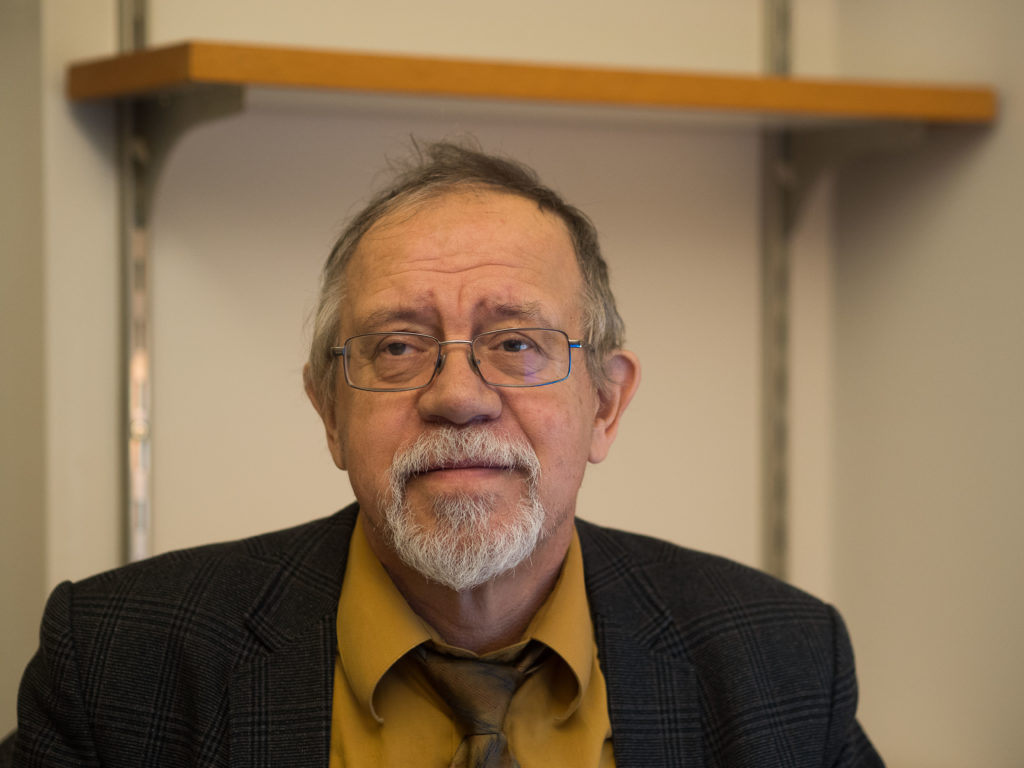
Alexander Kubyshkin is a professor at the School of Liberal Arts and Sciences at Saint Petersburg State University in St. Petersburg, Russia. He is currently visiting Grinnell to teach the special topics short course “The Cold War: Russia and the U.S.” Kubyshkin recently sat down with The S&B’s Ahon Gooptu ’21 to talk about his Grinnell visit, his hopes for the course and his thoughts on the Cold War and today.
The S&B: What brings you to Grinnell?
Professor Alexander Kubyshkin: I have been in Grinnell almost two weeks and I’m here for eight weeks to teach a course about the history of [the] Cold War, focusing on the Russian-American relations during the period. It’s the first edition of the Cold War, not current — the relations as you know now are not so good — but I’m sure that it’s absolutely necessary to study the history of the competition and the development of cooperation between the United States and the Soviet Union in the period after World War II.
What are you most excited about in regard to this eight-week course?
I hope that we will cover all the main trends of development, competition, confrontation and sometimes, business cooperation between the Soviet government and American government. We will try to pay attention to the personal factors involved. It’s very important how the leaders of both countries tried to maintain their work and relationship. For example, Stalin was very pragmatic in the work front, Nikhita Krushchev had close contact with Eisenhower and of course, Leonid Brezhnev and Richard Nixon worked in close cooperation regarding the arms race, the missile systems and other strategic agreements. Russia and America have a very rich cultural and political history and all these elements are included in the discussions of the Cold War period.
Do you think that the Cold War era has influenced what is happening in the world right now?
I am sure that now we are going through a difficult period. But … I think it’s connected with the global discourse, what with the radical changes that we have witnessed in the world in the last twenty years. It’s the challenge of international terrorism, the new challenge of the state of our environment, various socioeconomic problems. I have been working with American students for many years … and throughout my academic career, I have tried to organize a direct contact between the Russian and American students’ course because my position is the most important for their understanding of friendly relations between the two cultures. The situations in Ukraine, in Syria and in other such areas makes the relations between the United States and Russia more complicated than what they were 10 to 15 years ago. But everything has changed. … Russia has changed too. Do not forget that we have only 25 years of democratic experience. So the Russian approach to international relations and economy also has its fair share of problems. But I am confident that, in spite of all the problems and misunderstanding, step by step, Russia and the United States will find a common approach and find a solution for normal, workable relations and probably work in closer cooperation.
Having taught this course to students from both America and Russia, do you find that teaching them in the same environment causes problems or are they equally eager to learn about the Cold War era and the role it had to play?
I think that when American students come to Russia, they begin to lose some stereotypes. Of course, Russians have lots of stereotypes about the Americans and the American students have the same. … So when we discuss [the Cold War] in the Russian atmosphere, Americans notice that there are a lot of differences between the social order, the economic situation and cultural background. But they adapted to the Russian reality very quickly and so they became very open, honest and responsible. That’s why I think we have a very good basis for cooperation when studying about such sensitive problems in history, like the World War II and the Cold War period. Americans are very well informed about the war in the Pacific basin but very few know about the eastern front. The Russian students, on the contrary, know everything about Stalingrad and almost nothing about Midway and the Pacific islands. During the Cold War classes, we discuss the reasons why two countries sometimes do not understand the ideological roots, politics, business, cultural and religious traditions and it helps the students from both countries to understand each other better.





























































